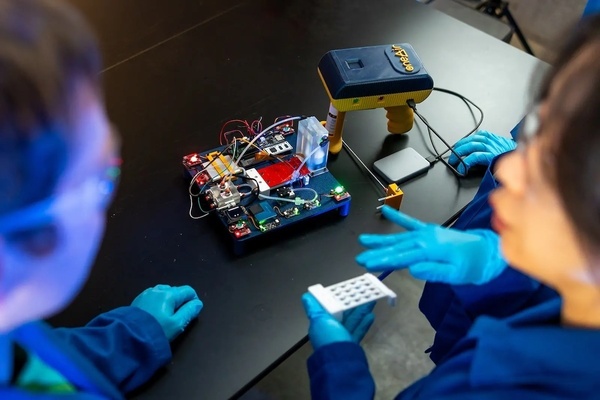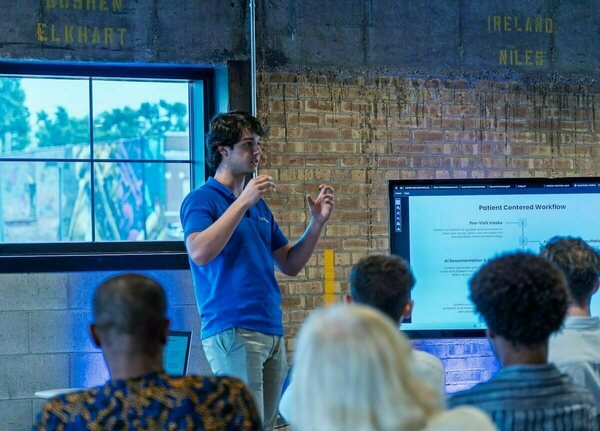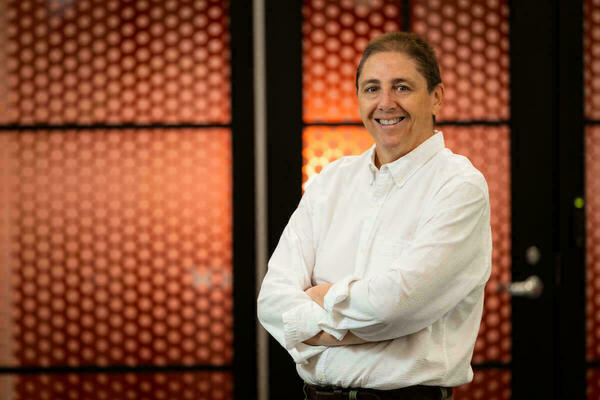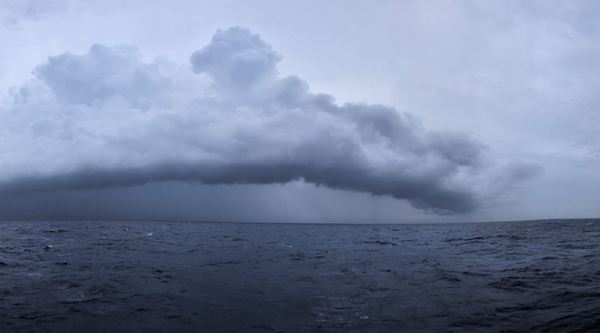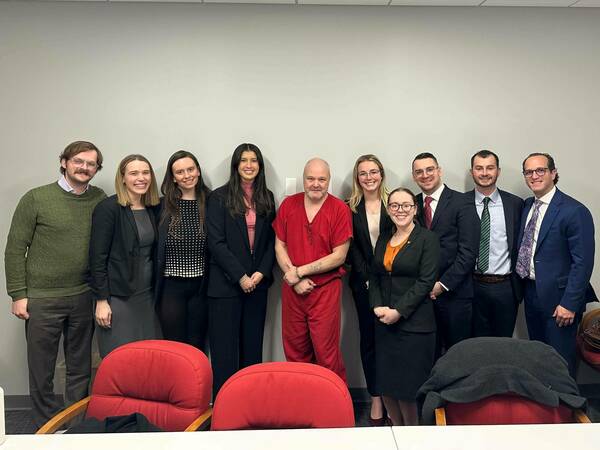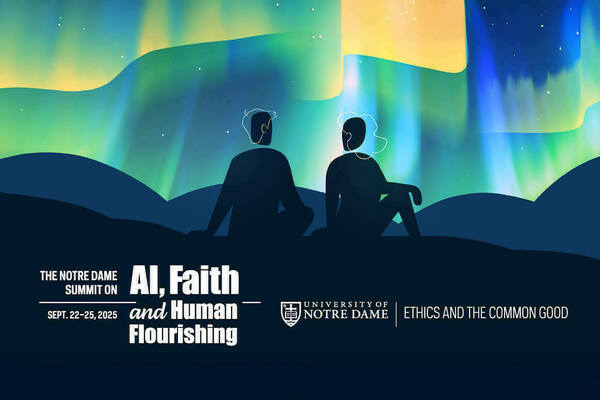NSF-funded student fellows inspired by summer cyberinfrastructure research
Eleven U.S. National Science Foundation (NSF) CI Compass student fellows spent the summer working with organizations performing research on the ocean, the atmosphere, and the sun—all through the lens of cyberinfrastructure (CI). Working with several individual NSF Major Facilities and other CI partners throughout the cyberinfrastructure ecosystem, they gained a deep understanding of the technological foundation that powers new discoveries in today’s data-intensive scientific fields.
As the NSF CI Compass Fellowship Program (CICF) finished its third year, students who completed the Spring Program were invited to apply for the Summer Program with NSF Major Facilities and CI partners. During the Spring Program, the students learned about technical aspects of CI, such as computing systems, data storage systems and repositories, advanced instrumentation, data visualization environments, and high-performance computing and networks, which they were then able to apply to their summer experiences.
“The relationships CI Compass has established within the cyberinfrastructure-ecosystem deepens our understanding of facilities needs. This understanding and these relationships help us develop and provide learning opportunities for our student fellows,” said Angela Murillo, director of CICF.
The fellows 2024 summer project placements included:
-
Ingrid Carlson, of Carroll College, CICF 2024, with NSF National Center of Atmospheric Research (NCAR).
-
Matthew Chung, of the University of California, Riverside, CICF 2024, with Globus.
-
Cailin Cobey, of Villanova College, CICF 2024, with NSF Ocean Observatories Initiative (OOI).
-
Ellie Fahey, of the University of Notre Dame, CICF 2023, with the NSF National Solar Observatory (NSO).
-
Raymond James Gallant, of the Eastern New Mexico University, CICF 2024, with NSF NCAR.
-
Mark Onders, of the University of Notre Dame, CICF 2023, with NSF NCAR.
-
Palina Pauliuchenka, of the New Jersey Institute of Technology, CICF 2024, with NSF OOI.
-
Quan Quy, of the Rochester Institute of Technology, CICF 2024, with the NSF National High Magnetic Field Laboratory (MagLab).
-
Mahee Shah, of the University of Iowa, CICF 2023, with NSF NCAR.
-
Lisa Schulz, of California Polytechnic State University, San Luis Obispo , CICF 2024, with the University of Notre Dame Environmental Research Center (UNDERC), a National Ecological Observatory Network (NEON) partner.
-
Connor Vessely, of Ball State University, CICF 2024, with NSF OOI.
Brian Dobbins of NSF NCAR, Jeff Glatstein of NSF OOI, Bob Tawa of NSO, David Butcher and Julia Smith of Maglab, Nathan Swensen of UNDERC, and Kyle Chard of Globus mentored and coordinated the summer fellows at their respective facilities.

|

|
At the end of the summer, fellows presented their work at the CICF Summer Symposium and described their summer experiences, what they learned, and how these experiences impacted their careers in a virtual symposium about their experiences. “This experience led me to develop more of my ability to problem solve,” Schulz said of her experience with UNDERC over the summer.
Schulz, whose undergraduate studies focus on Mathematics, is now considering taking her Master’s studies in the direction of Applied Math. “With Applied Math, you can play a bigger role in modeling different situations and helping to solve problems in all kinds of scientific fields,” she said.
“The fellows come back from their summer experiences with new connections and fresh inspiration on how technical skills we introduced during the Spring Program can be applied,” said Murillo. “This experience gives the fellows an idea of how CI and related technologies can impact scientific discoveries.”
The Spring Program introduces the fellows to aspects of computer science that they have not considered in their undergraduate studies.
"The program has been a catalyst to my academic career and has sparked a new interest in High-Performance Computing (HPC), which is something I previously knew nothing about,” said Gallant. “The program gave me an overview of the different technologies used at NSF Major Facilities and then allowed me to spend the summer at NSF NCAR engaging with the different technologies hands-on. This program has made a significant impact on my future."=

|

|
Another Fellow, Paliuchenka, said her favorite part of the program was learning about the diverse cyberinfrastructures that exist.
“Hearing first-hand from professionals that are passionate about their work and contributions was particularly interesting,” she said. “CICF is a remarkable fellowship that broadens perspectives for young researchers, demonstrating that research extends beyond traditional Ph.D. programs.”
Through her experience with OOI, Paliuchenka said the program “aligned perfectly” with her aspirations of pursuing a Ph.D.
The CICF Summer Program is an optional experience for Spring Program participants. Fellows are encouraged to apply for project-based learning experiences supported either by NSF Major Facilities and CI partners as they learn throughout the spring. For the 2024 Spring Program, CICF had 128 students apply, with 19 accepted and participating. Eleven students were able to serve in Summer Program placements during Summer 2024.
Watch the NSF CI Compass Fellowship Program - 2024 Summer Symposium here:
Learn more about the CICF program by visiting: CI Compass Student Fellowships.
About CI Compass
CI Compass is funded by the NSF Office of Advanced Cyberinfrastructure in the Directorate for Computer and Information Science and Engineering under grant number 2127548. Its participating research institutions include the University of Southern California, Indiana University, Texas Tech University, the University of North Carolina at Chapel Hill, the University of Notre Dame, and the University of Utah.
To learn more about CI Compass, please visit ci-compass.org.
Contact: Christina Clark, Research Communications Specialist
CI Compass / Notre Dame Research / University of Notre Dame cclark26@nd.edu / 574.631.2665
Originally published by at ci-compass.org on October 08, 2024.
Latest Research
- Fighting for Better Virus DetectionAn electronic nose developed by Notre Dame researchers is helping sniff out bird flu biomarkers for faster detection and fewer sick birds. Read the story
- Notre Dame’s seventh edition of Race to Revenue culminates in Demo Day, a celebration of student and alumni entrepreneurship…
- Managing director brings interdisciplinary background to Bioengineering & Life Sciences InitiativeThis story is part of a series of features highlighting the managing directors of the University's strategic initiatives. The managing directors are key (senior) staff members who work directly with the…
- Monsoon mechanics: civil engineers look for answers in the Bay of BengalOff the southwestern coast of India, a pool of unusually warm water forms, reaching 100 feet below the surface. Soon after, the air above begins to churn, triggering the summer monsoon season with its life-giving yet sometimes catastrophic rains. To better understand the link between the formation of the warm pool and the monsoon’s onset, five members of the University of Notre Dame’s Environmental Fluid Mechanics Laboratory set sail into the Bay of Bengal aboard the Thomas G. Thompson, a 274-foot vessel for oceanographic research.
- Exoneration Justice Clinic Victory: Jason Hubbell’s 1999 Murder Conviction Is VacatedThis past Friday, September 12, Bartholomew County Circuit Court Judge Kelly S. Benjamin entered an order vacating Exoneration Justice Clinic (EJC) client Jason Hubbell’s 1999 convictions for murder and criminal confinement based on the State of Indiana’s withholding of material exculpatory evidence implicating another man in the murder.
- Notre Dame to host summit on AI, faith and human flourishing, introducing new DELTA frameworkThe Institute for Ethics and the Common Good and the Notre Dame Ethics Initiative will host the Notre Dame Summit on AI, Faith and Human Flourishing on the University’s campus from Monday, Sept. 22 through Thursday, Sept. 25. This event will draw together a dynamic, ecumenical group of educators, faith leaders, technologists, journalists, policymakers and young people who believe in the enduring relevance of Christian ethical thought in a world of powerful AI.








